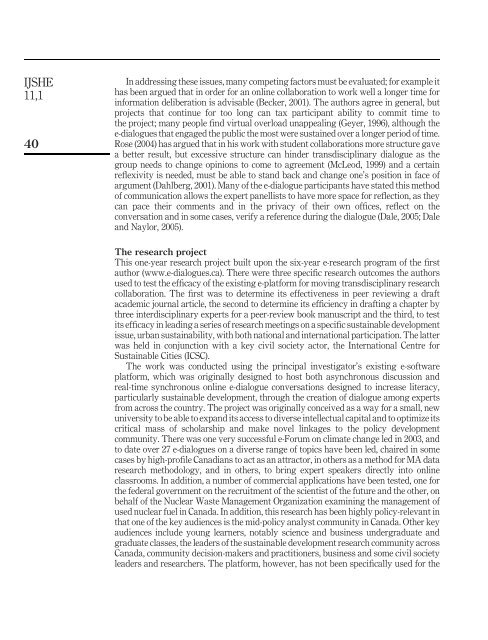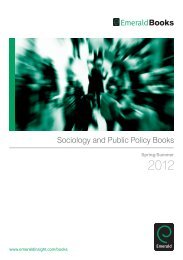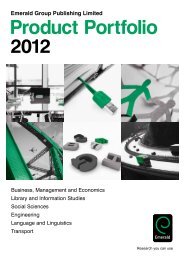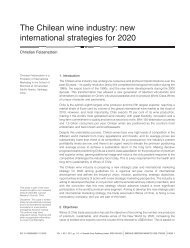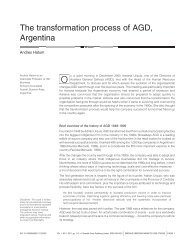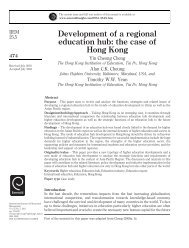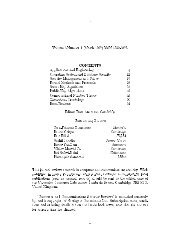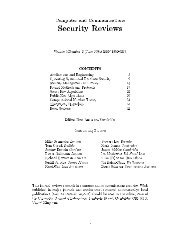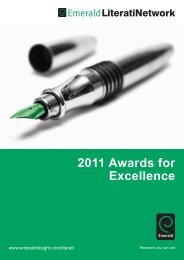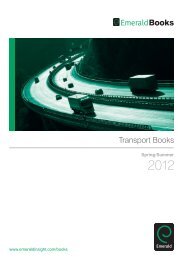Facilitating transdisciplinary sustainable development research ...
Facilitating transdisciplinary sustainable development research ...
Facilitating transdisciplinary sustainable development research ...
You also want an ePaper? Increase the reach of your titles
YUMPU automatically turns print PDFs into web optimized ePapers that Google loves.
IJSHE<br />
11,1<br />
40<br />
In addressing these issues, many competing factors must be evaluated; for example it<br />
has been argued that in order for an online collaboration to work well a longer time for<br />
information deliberation is advisable (Becker, 2001). The authors agree in general, but<br />
projects that continue for too long can tax participant ability to commit time to<br />
the project; many people find virtual overload unappealing (Geyer, 1996), although the<br />
e-dialogues that engaged the public the most were sustained over a longer period of time.<br />
Rose (2004) has argued that in his work with student collaborations more structure gave<br />
a better result, but excessive structure can hinder <strong>transdisciplinary</strong> dialogue as the<br />
group needs to change opinions to come to agreement (McLeod, 1999) and a certain<br />
reflexivity is needed, must be able to stand back and change one’s position in face of<br />
argument (Dahlberg, 2001). Many of the e-dialogue participants have stated this method<br />
of communication allows the expert panellists to have more space for reflection, as they<br />
can pace their comments and in the privacy of their own offices, reflect on the<br />
conversation and in some cases, verify a reference during the dialogue (Dale, 2005; Dale<br />
and Naylor, 2005).<br />
The <strong>research</strong> project<br />
This one-year <strong>research</strong> project built upon the six-year e-<strong>research</strong> program of the first<br />
author (www.e-dialogues.ca). There were three specific <strong>research</strong> outcomes the authors<br />
used to test the efficacy of the existing e-platform for moving <strong>transdisciplinary</strong> <strong>research</strong><br />
collaboration. The first was to determine its effectiveness in peer reviewing a draft<br />
academic journal article, the second to determine its efficiency in drafting a chapter by<br />
three interdisciplinary experts for a peer-review book manuscript and the third, to test<br />
its efficacy in leading a series of <strong>research</strong> meetings on a specific <strong>sustainable</strong> <strong>development</strong><br />
issue, urban sustainability, with both national and international participation. The latter<br />
was held in conjunction with a key civil society actor, the International Centre for<br />
Sustainable Cities (ICSC).<br />
The work was conducted using the principal investigator’s existing e-software<br />
platform, which was originally designed to host both asynchronous discussion and<br />
real-time synchronous online e-dialogue conversations designed to increase literacy,<br />
particularly <strong>sustainable</strong> <strong>development</strong>, through the creation of dialogue among experts<br />
from across the country. The project was originally conceived as a way for a small, new<br />
university to be able to expand its access to diverse intellectual capital and to optimize its<br />
critical mass of scholarship and make novel linkages to the policy <strong>development</strong><br />
community. There was one very successful e-Forum on climate change led in 2003, and<br />
to date over 27 e-dialogues on a diverse range of topics have been led, chaired in some<br />
cases by high-profile Canadians to act as an attractor, in others as a method for MA data<br />
<strong>research</strong> methodology, and in others, to bring expert speakers directly into online<br />
classrooms. In addition, a number of commercial applications have been tested, one for<br />
the federal government on the recruitment of the scientist of the future and the other, on<br />
behalf of the Nuclear Waste Management Organization examining the management of<br />
used nuclear fuel in Canada. In addition, this <strong>research</strong> has been highly policy-relevant in<br />
that one of the key audiences is the mid-policy analyst community in Canada. Other key<br />
audiences include young learners, notably science and business undergraduate and<br />
graduate classes, the leaders of the <strong>sustainable</strong> <strong>development</strong> <strong>research</strong> community across<br />
Canada, community decision-makers and practitioners, business and some civil society<br />
leaders and <strong>research</strong>ers. The platform, however, has not been specifically used for the


